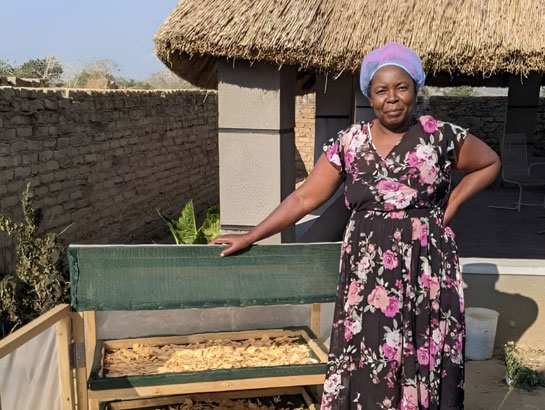Abigirl Chigangaidze, a smallholder farmer in Guruve, Zimbabwe, faced significant challenges in preserving her nutrient-rich crops, particularly vitamin A orange sweet potatoes and various vegetables. Traditional drying methods often resulted in spoilage, nutrient loss, and reduced economic returns. In Zimbabwe, post-harvest losses are estimated at 20–30 percent during storage alone, escalating to as much as 40 percent when factoring in losses during fieldwork, transportation, handling, and processing. However, the introduction of solar dryers through the Expanding Nutrients in Food Systems (ENFS) project, funded by the Government of Canada, and implemented by HarvestPlus has brought a life-changing solution to these challenges.
Through the project, the farmers in Guruve, Mazowe, Mt. Darwin, and Bindura in Zimbabwe’s Mashonaland Central Province were made aware of solar dryers specifically designed to reduce post-harvest losses and preserve essential nutrients in crops. These dryers, constructed using locally available materials, enable farmers to dry their produce more efficiently, retaining vital nutrients and extending shelf life. Through training workshops, women in the community, including Chigangaidze, were trained on how to construct and use of these dryers, allowing them to preserve and process their crops while maintaining high quality produce. Chigangaidze, leveraging the training she received, quickly adopted solar dryer technology, constructing two dryers at USD 45 each. She successfully used them to dry vitamin A orange sweet potatoes and other vegetables, improving her family’s access to a diverse diet. The dried produce has also opened new income-generating opportunities; in July 2024, Chigangaidze sold 50 packets of dried vegetables within her community.
The impact of solar dryers extends beyond crop preservation. Farmers like Chigangaidze are now able to generate additional income through the sale of value-added products, supported by HarvestPlus Zimbabwe’s training in food packaging, labeling, and marketing. This innovation has created new commercial avenues, with potential for both local and export markets.
The ENFS project is focused on improving nutrition security and economic empowerment for vulnerable populations, particularly women and children. The introduction of solar dryers is a key initiative within this project, enhancing the availability of nutrient-dense foods and supporting the livelihoods of smallholder farmers in Zimbabwe.
